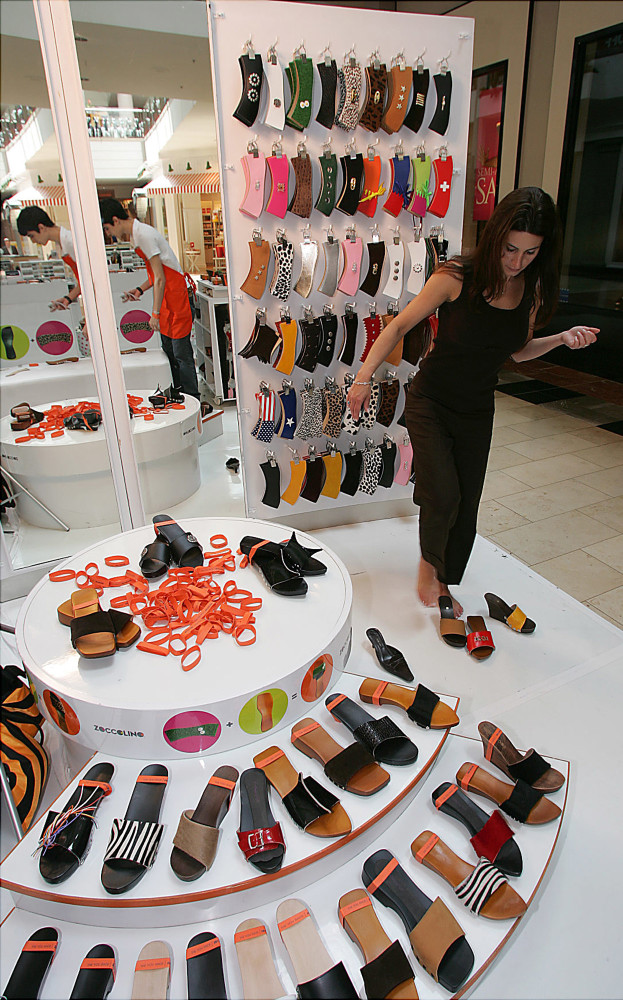By Leah Binkovitz
Houston Chronicle.
“Can I ask you a question?”
“Do you straighten your hair?”
“Here, this is for you.”
Making a sale is, as the vendors at the carts and kiosks at the Katy Mills mall will tell you, an art.
Getting families loaded down with kids and shopping bags to stop en route to the Rainforest Cafe can be hard but, for many, worth it, as a way into entrepreneurship.
Katy Mills mall is, as far as outlet malls go, typical. Bright reds and yellows and funky sculpture at the many entryways give the entirely indoor mega mall opened in 1999 a family-friendly feeling. The stores cater to cost-conscious customers. And features like a carousel inside the food court, indoor trampoline jumping and a mini “train” that takes passengers through the mall add a touch of whimsy.
Amid all this, the individuals manning the retail islands known as carts or kiosks have to stand out. According to Harry Strehle and Chase Noll, the way to do that is easy: Sell what customers want. In their case, that means custom-made T-shirts they can print on the spot if a buyer can’t find what you want already in stock.
Their ultimate dream: “Dominate the custom clothing market,” Strehle said.
He has plans to buy an embroidery machine, maybe move into custom vehicle wraps and expand to other malls. But for now, the friends are in only their sixth day at Customize The World, the name of their stand.
The two met working at similar operations for other people and thought they could try their hand at it.
“I’ve been limited to $10 an hour no matter how many sales I make,” Strehle said. “You fill up the cashier box but don’t get to count it.”
Strehle has been working since he was 15, when he moved to New Jersey and sold T-shirts on the boardwalk. He has the skills and know-how; he just had never been his own boss. He’s only 21 now. Noll is younger, 20. But they feel good about going into business for themselves.
“The thing about America is, in the blink of an eye, you can go up or down,” Strehle said.
It’s a belief that has become fact through repetition, although data reveals that an individual’s economic well-being may have just as much to do with ZIP code as it does gumption. But many, including young entrepreneurs and recent immigrants, still believe in this American ideal and bet their lives on it.
“That’s what’s so great about it,” said Patricia Norins, publisher of the quarterly Specialty Retail Report, which tracks the kiosk, cart, automated and otherwise temporary retail industry. “It’s just a great opportunity.”
The industry in North America, according to Norins, represents an $8 billion business, with roots stretching back to the European market place — sort of.
The origin for the kiosk industry starts in Boston, at Faneuil Hall. Constructed in the colonial era, the hall has hosted meetings and shops for centuries. When the building was being updated in the 1970s, said Norins, developers thought to add kiosks as a way to recall the European marketplace feel of days gone by. But it wasn’t until the ’80s that the kiosk industry really took off when malls, and outlet malls in particular, boomed.
“Bottom line,” said Norins, “is the industry offers a lot of people an opportunity to start a business for the first time.” Often seizing on a fleeting trend, carts can move inventory quickly and make a profit. “For less than $5,000, you can start a business,” she said.
So far, Umair Alam has enjoyed working for himself, even though the business partnership with his brother, Syed Mubashir Alam, sometimes leads to fights.
“We are brothers,” he said, matter of factly.
Both still in their 20s, the two had worked retail and fast food before opening Star Jewelry at Katy Mills 3 1/2 years ago.
“You just have to have a great idea,” said Umair.
Being from the Houston area, he had thought about going into oil and gas, but it didn’t really suit him.
“I’m a people person,” he said. So instead, he took an entrepreneurship course at the local Houston Community College branch and learned the basics. “I found out business is where I’m at.”
Now he hopes to expand beyond the jewelry world, but for now, he’s happy. His customers are diverse, coming from all over the world, like his own parents, who came here from Pakistan.
“You name it, they’re here,” said Umair.
Many of the vendor operators are equally diverse. Strehle admits that he and Noll are a bit of a rarity, being two white men in the kiosk game, but the promise of opportunity is attractive to young people in general.
“It’s really good money, honestly,” said Cerina George. After working at a makeup cart for three years, George now owns it, making her a business owner at 19. Her first week in the new role, she said, “it feels good; I’m kind of in a daze.”
Her makeup is flawless, like a doll, softening her obvious ambition.
“I didn’t want to work for somebody my whole life,” she said. Now she has four employees, whom she said she’s training to one day own their own businesses, maybe a cart or kiosk.
Many people working the carts have stories like George’s, or they know of someone with a spectacular story. Strehle and Noll talk about a man named Eric whom they worked for in The Woodlands. He came from Turkey with $400, so the story goes, and put it all into his first business.
Now they are taking a similar chance. Amid T-shirts that say things like Trap Queen, the two are almost done setting up their new shop. They are ready with a pitch about the quality of the printing and the product.
“If you don’t see anything you want, we’ll make you what you want,” Strehle said.














































































































































































































































































































































































